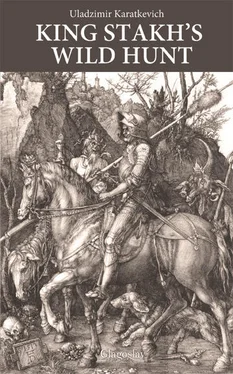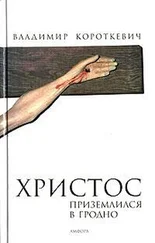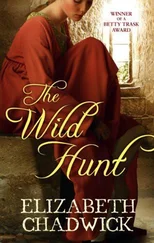“That'll do,” I said. “It's disgusting to hear you. And although you deserve the noose, we won't kill you. We've given our word. Later we'll investigate, and if you are very much to blame, we'll hand you over to the provincial court and if not — we'll let you go free.”
Hardly had I finished, when Stachievič suddenly pushed two of the mužyks away, tore off, and with exceptional swiftness made for the horses. With his foot he kicked in the belly the mužyk guarding the horses, threw himself into the saddle and started to gallop at full speed. He turned about on the way and shouted in a scathing tone.
“Just you wait for the trial in the provincial court! I'm off to Dubatoŭk's, he'll have the gentry of the whole region rise against you, you skunks, and we'll put an end to all of you. And you, you cad from the capital, there'll be no life for you and that loose woman of yours. But you, you stupid Michał, let it be known to you that it was me who trampled your brother to death, and you'll get the same.”
Michał turned the muzzle of his long gun and without taking aim pulled the trigger. Stachievič silently turned a somersault out of the saddle, rolled over several times on the ground and fell silent.
Michał came up to him, took the horse by the bit, shot Stachievič straight in the forehead. Then said severely to me:
“Go ahead, Chief. Your kindness to them was a bit too early. Away with kindness! The gypsy wedding will get along without marzipans. Go on, we'll catch up with you. Take the road to the Cold Hollow. And don't turn back to take a look.”
I left... And indeed, what right had I to be sentimental? If this bandit got to Dubatoŭk — they would overflow the whole region with blood. And Dubatoŭk must be captured all the sooner. Today, this very night, we must take him.
From behind I heard moaning and groaning. The wounded there were being finished off. I wanted to turn back, but couldn't. My throat was parched. But wouldn't they have done even worse with us?
The mužyks caught up with me half way to the Hollow. They raced on the drygants with pitchforks in their hands.
“Mount, Chief,” Michał said good-naturedly, pointing to a horse. “With these everything is over. And the Gap won't tell anybody.”
I answered as calmly as I could:
“Let bygones be bygones. But now as quickly as possible to Ryhor. Then together with him we'll go to Dubatoŭk's house.”
We hastened to the Hollow, reaching it in the twinkling of an eye, and there we found the very end of the same tragedy. Ryhor kept his word, though they didn't deal with the participants of the Wild Hunt as they did with horse-thieves. Horse-thieves they simply killed outright. The last of the living hunters here lay on his back in front of Ryhor. He was quite a young fellow. And he, guessing from my clothes that I was not a peasant, suddenly began to scream:
“Mother mine! Mother mine! They're killing me.”
“Ryhor,” I begged. “You don't need to kill him, he's so young yet.”
And I seized him by the shoulder, but my hands were caught from behind.
“Away with you!” Ryhor shouted. “Take him away, this blockhead. Did they have any pity for our children in Jarki? They died of hunger — of hunger! A person, in your opinion, has no right to eat? This one has a mother dear! And haven't we mothers? Or didn't Michał have a mother? Haven't you got one, that you are so kind? You sniveller! And don't you know that this very ‘young fellow’ shot Symon, Zośka's brother, and killed him? Never mind, we'll commit such outrages as in the song “The Vampires' Night”. [9] “The Vampires' Night” — a great slaughter of aristocrats committed by peasants during the Muraška Rebellion in the 17th century.
And Ryhor, turning, struck his pitchfork into the man lying prostrate on the ground.
I went aside and sat down.
I was sick and didn't immediately hear Ryhor coming up to me and taking me by the shoulder when the dead were already being thrown into the quagmire.
“You're a fool, you are! You think I'm not sorry? My heart is bleeding. It seems to me I'll never again in my life be able to sleep calmly, but suffering must be endured, and once we've begun, then on to the end. Not a single one to be left, only we alone by mutual guarantee should know... ‘A young one!’ You think this young one wouldn't have grown into an old skunk? He would, certainly! Especially when recalling this night. His ‘pity’ for our people, bondsmen, will be something only to marvel at. Let him go — and we'll have the law here. For me and you — the noose, for Michał and the rest — penal servitude. The region will overflow with blood, they'll beat so hard that the flesh from our backsides will come off in rags.”
“I understand,” I said. “Not a single one of these must remain alive. I've just recalled Śvieciłovič. We must go to Dubatoŭk — to the last one left alive.”
“Well,” Ryhor grumbled, though tenderly. “Lead the way.”
With our detachment behind us, we moved on towards Dubatowsk's house.. We flew at a gallop, our horses raced as if wolves were after them. The moon dimly shone on our calvacade, on the mužyks' leather coats, the pitchforks, the dark faces, the scarecrows on some of the horses. We had to skirt the marsh round the Janoŭski Reserve. The road seemed a rather long one till we came to where we saw the linden tree-tops near Dubatoŭk's house. The moon flooded them with a deathly pale light; although it was very late, a light was burning in three windows.
I ordered the people to dismount about fifty metres away from the house and surround it in a close circle. The torches to be held in readiness and to light them when the signal was given. The command was fulfilled in silence. I crept over a low fence and walked through rows of almost bare apple trees lit by a flickering uncertain moonlight.
“Who's with the horses?” I asked Ryhor who was walking behind me.
“One of the boys. In case anything should happen, he will signal us. He whistles very well.”
We stole on farther, and our boots stepped softly on the wet earth. I came up to a window. Dubatoŭk was nervously walking from one corner of the room to another, glancing often at the clock on the wall.
He was unrecognizable. This was an altogether different Dubatoŭk, and alone by himself, the real one, of course. What had become of his kindness, cordiality and tenderness? Where had that rosy face disappeared to, a face as healthy and merry as the face of Santa Claus? The face of this Dubatoŭk was yellow, the corners of his mouth were sharply lowered, near his nose were sharp wrinkles. His sunken eyes looked dead and dark. I was horrified on seeing him, as a person becomes horrified, when on awakening in the morning after a night's sleep, he finds a snake in his bed, the snake having crept into it to warm itself, and then spent the night with him there.
“How could I have been so careless?” I thought.
Yes, the sooner we put an end to him, the better. We just had to do it. He, alone, is more dangerous than ten Wild Hunts. It's well that during our fight I deprived him for a while of the possibility of riding his horse, for otherwise it would have been tough for us. He would not have placed himself right in front of a bullet, he would not have split up his detachment, — he would have run us down like kittens with his horse's hoofs, and we'd have been lying now at the bottom of the Gap with our eyes put out.
“Ryhor, send seven men here. Have them break down the door of the entrance, while I'll try to tear off a board from the shed and make an unexpected attack on him from there. But see to it, everybody together...”
“Perhaps we could pretend we are the Hunt and knock at the window, and when he opens it, we'll grab him. He's sent his relatives somewhere, he's at home alone,” Ryhor suggested.
Читать дальше



